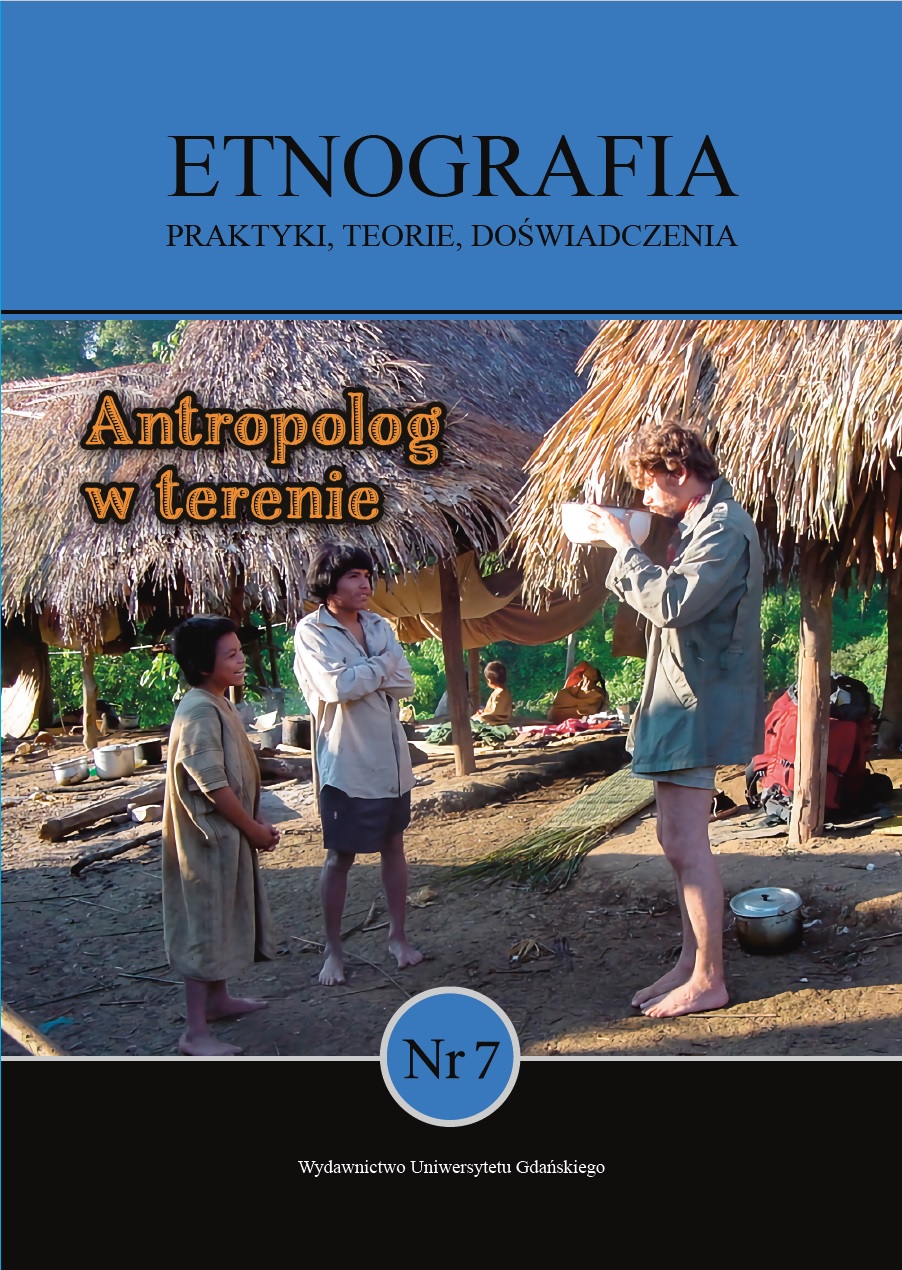Wdowy, polityczki, feministki i ja. Esej o antropologii na rogu ulicy
DOI:
https://doi.org/10.26881/etno.2021.7.13Słowa kluczowe:
fieldwork, female anthropologist, researcher’s positionality, female research partners, closeness, reciprocity, informal tourism sector, orced displacement, IndiaAbstrakt
In the article, I tell the stories of a few female research partners of mine, who accompanied me during ethnographic fieldwork on forced displacement at the UNESCO World Heritage site in Hampi, India. These women differed in every respect: their ethnic origin and caste, religious affiliation, age, marriage status, social position, level of education, and person- ality. What they had in common was their agency in challenging social expectations and an extraordinary capability to be resilient. I scrutinize my close, albeit not always easy relationships with them, the process of rapport-building in the field, the power relations inscribed in ethnographic research and my own changing positionality vis-a-vis women from my street in Hampi.
Downloads
Bibliografia
Agar, M. (1980). The Professional Stranger. An Informal Introduction to Ethnography. New York: Academic Press.
Barley, N. (1997). Niewinny antropolog. Przeł. E.T. Szyler. Warszawa: Prószyński i S-ka. Barrios, R.E. (2016). Resilience: A Commentary from the Vantage Point of Anthropology. Annals of Anthropological Practice, 40(1), 28–38.
Bloch, N. (2011). Teren a władza, czyli kto tu rządzi? Moje doświadczenia w badaniu uchodźców tybetańskich. W: T. Buliński, M. Kairski (red.), Teren w antropologii. Prak- tyka badawcza we współczesnej antropologii kulturowej (s. 209–235). Poznań: Wydawnic- two Naukowe UAM.
Bloch, N. (2016). Evicting Heritage. Spatial Cleansing and Cultural Legacy at the Hampi UNESCO Site in India. Critical Asian Studies, 48(4), 556–578.
Bloch, N. (2017a). Barbarians in India. Tourism as Moral Contamination. Annals of Tourism Research, 62, 64–77.
Bloch, N. (2017b). Taxonomic Panic and the Art of “Making Do” at a Heritage Site. The Case of Hampi UNESCO Site, India. Anthropological Notebooks, 23(3), 19–44.
Bloch, N. (2018a). Bliscy nieznajomi. Turystyka i przezwyciężanie podporządkowania w postkolo- nialnych Indiach. Poznań: Wydawnictwo Naukowe UAM.
Bloch, N. (2018b). Making Tourists Engaged by Vulnerable Communities in India. W: S. Owsianowska, M. Banaszkiewicz (red.), Anthropology of Tourism in Central and Eastern Europe. Bridging Worlds (s. 181–197). Lanham, Boulder, New York, London: Lexington Books.
Bollig, M. (2014). Resilience – Analytical Tool, Bridging Conceptor Development Goal? Anthropological Perspectives on the Use of a Border Object. Zeitschrift für Ethnologie, 139(2), 253–279.
Bourdieu, P. (1986). The Forms of Capital. W: J.G. Richardson (red.), Handbook of Theory and Research for Sociology of Education (s. 241–258). New York, Westport, London: Green- wood Press.
Caplan, P. (1988). Engendering Knowledge. Anthropology Today, 4(5), 8–12; 4(6), 14–17. Callaway, H. (2005). Ethnography and Experience. Gender Implications in Fieldwork and Texts. W: J. Okely, H. Callaway (red.), Anthropology and Autobiography (s. 29–48).
London, New York: Routledge.
Channa, S.M. (2007). Hinduska kobieta: konstrukt i prawda w dobie globalizacji. Przeł.
M. Bierca. W: R.E. Hryciuk, A. Kościańska (oprac.) Gender. Perspektywa antropologiczna
(s. 258–275). Warszawa: Wydawnictwa Uniwersytetu Warszawskiego.
Cohen, E. (1982). The Pacific Islands from Utopian Myth to Consumer Product: The Disenchantment of Paradise. Aix-En-Provence: Centre des Hautes
Etudes Touristiques.
Crick, M. (2005). Ali and Me. An Essay in Street-corner Anthropology. W: J. Okely, H. Cal- laway (red.), Anthropology and Autobiography (s. 173–189). London, New York: Routledge.
Domańska, E. (2008). O poznawczym uprzywilejowaniu ofiary (Uwagi metodologiczne). W: H. Gosk, B. Karwowska (red.), (Nie)obecność. Pominięcia i przemilczenia w narracjach XX wieku (s. 19–36). Warszawa: Elipsa.
Geertz, C. (2010). Po fakcie. Dwa kraje, cztery dekady, jeden antropolog. Przeł. T. Tesznar. Kra- ków: Wydawnictwo Uniwersytetu Jagiellońskiego.
Hendry, J. (2005). The Paradox of Friendship in the Field. Analysis of a Long-term Anglo- -Japanese relationship. W: J. Okely, H. Callaway (red.), Anthropology and Autobiography (s. 161–171). London, New York: Routledge.
Holmes, D.R., Marcus, G.E. (2009). Przeformułowanie etnografii. Wyzwanie dla antro- pologii współczesności. Przeł. K. Miciukiewicz. W: N.K. Denzin, Y.S. Lincoln (red.), Metody badań jakościowych, t. 2 (s. 645–662). Warszawa: PWN.
Loomba, A. (2011). Kolonializm/Postkolonializm. Przeł. N. Bloch. Poznań: Wydawnictwo Poznańskie.
Malinowski, B. (2002). Dziennik w ścisłym znaczeniu tego wyrazu. Oprac. G. Kubica-Heller. Kraków: Wydawnictwo Literackie.
Marcus, G.E. (1995). Ethnography in/of the World System: The Emergence of Multi-sited Ethnography. Annual Review of Anthropology, 24, 95–117.
Okeley, J. (2005). Anthropology and Autobiography: Participatory Experience and Embo- died Knowledge. W: J. Okely, H. Callaway (red.), Anthropology and Autobiography (s. 1–28). London, New York: Routledge.
Rabinow, P. (2010). Refleksje na temat badań terenowych w Maroku. Przeł. S. Sikora, K.J. Dudek. Kęty: Wydawnictwo Marek Derewiecki.
Ryang, S. (2000). Ethnography or Self-cultural Anthropology?: Reflections on Writing About Ourselves. Dialectical Anthropology, 25, 297–320.
Spivak, G. Ch. (2011). Czy podporządkowani inni mogą przemówić? Przeł. E. Majewska. Krytyka Polityczna, 24–25, 196–239.
Tsing, A.L. (2005). Friction. An Ethnography of Global Connection. Oxford: Princeton Uni- versity Press.
Whitehead, T.L., Conaway, M.E. (1986). Self, Sex, and Gender in Cross-Cultural Fieldwork. Urbana: University of Illinois Press.
Opublikowane
Wersje
- 2023-10-17 - (2)
- 2021-12-23 - (1)
Jak cytować
Numer
Dział
Licencja
Czasopismo wydawane jest na licencji Creative Commons Uznanie autorstwa-Na tych samych warunkach 4.0 Międzynarodowe.

 Uniwersyteckie Czasopisma Naukowe
Uniwersyteckie Czasopisma Naukowe








